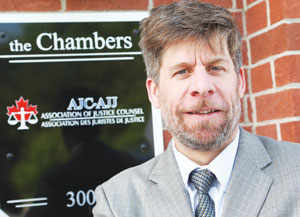Budget cuts that include restrictions on access to paid legal databases and ordering transcripts and directives that include requirements to carpool to courthouses are the latest source of frustration for federal government lawyers, especially in southern Ontario.

The head of the association that represents lawyers at the Department of Justice and the Public Prosecution Service of Canada says the “nickel and diming” policies are sending a poor message to those who work for “the government’s law firm.”
Len MacKay, president of the Association of Justice Counsel, says “the product is going to suffer” if the federal government doesn’t invest more in its law firm. “We can only conclude the prime minister does not care,” says MacKay of the Conservative government led by Stephen Harper.
The cuts, which can make it difficult for federal lawyers to access even basic work materials, is somewhat “ironic” given the Conservatives’ reputation as a law-and-order government, says MacKay.
Federal lawyers made substantial wage gains in a 2012 contract after lengthy negotiations with the government. They are now the third-highest-paid government lawyers behind provincial Crowns in Ontario and Alberta.
Budget cuts imposed by the government have focused primarily on work-related expenses, says MacKay, since most of the department’s overall cost involves salaries.
As a result, work tools not considered luxuries in the private sector, such as technologically up-to-date smartphones, aren’t necessarily available for federal government lawyers.
The department issued BlackBerrys about four years ago but it isn’t replacing them even if they’re no longer working properly, says MacKay. He recounts how, when going on leave, he was asked to turn in his phone for another colleague to use despite broken keys on the device.
“If they are not working, we go without BlackBerrys,” says MacKay.
Federal lawyers can purchase their own phones, but it’s often difficult to use them to access the remote server and retrieve work e-mails, he notes. “It would be nice to look up a case in court” on a phone, but that’s not always possible, he adds.
A policy for federal civil servants called “cut the cord” requires them to choose between a wireless phone or a landline in their offices. While MacKay says the government has exempted most federal lawyers from that policy, even some managers at the Department of Justice have recently lost landlines.
A past audit of the use of subscription-based legal databases led to them no longer being accessible for many federal lawyers and prosecutors. “We are getting used to relying on CanLII and court web sites,” says MacKay.
Ordering transcripts also requires approval. And a directive in southern Ontario states that if more than one lawyer is travelling to an out-of town courthouse, even if it’s a short distance such as Toronto to Brampton, Ont., they must carpool rather than both claiming mileage.
For further distances, the government encourages lawyers to find a rental car from an approved list rather than using their own car and claiming mileage. A lawyer familiar with the policies in the national capital region says that in some cases, the rental cars cost more than mileage.
Other policies in that area have included a requirement to fill out a requisition form for exhibits or index tabs for written legal materials. “People were supposedly using too many tabs,” according to the lawyer.
In response to the concerns, the Department of Justice and the prosecution service both noted their commitment to ensuring that staff in all offices have “the tools they need to effectively do their work” while also considering ways to save money.
They say they make travel expense decisions in compliance with the national joint council directive that states that “the selection of the mode of transportation shall be based on cost, duration, convenience, safety, and practicality.” And the rules around BlackBerry devices are pursuant to a government-wide operating standard for the provision of telecommunication devices, say spokeswomen for the prosecution service and the Justice Department.
MacKay says he understands the desire to try to reduce expenses but he suggests that at some point, the policies can interfere with the ability of federal lawyers to do their jobs effectively.
Francoise Boivin, justice critic for the federal NDP, says she has sympathy for federal lawyers and their working conditions. “We are very aware of the issues. They are awesome professionals, yet they are being asked to do more with less,” she says.
“They are not being given the tools to perform,” she adds.
An NDP government would make it a priority to review how the government has administered the Justice Department in the past decade, including its dealings with its lawyers, says Boivin. “We will need a time out to analyze the impact [of the Conservative government] on the administration of justice,” she says.

 The head of the association that represents lawyers at the Department of Justice and the Public Prosecution Service of Canada says the “nickel and diming” policies are sending a poor message to those who work for “the government’s law firm.”
The head of the association that represents lawyers at the Department of Justice and the Public Prosecution Service of Canada says the “nickel and diming” policies are sending a poor message to those who work for “the government’s law firm.”